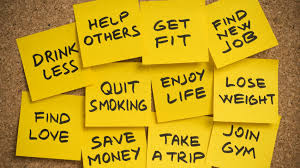
It is that time of year once again when many people make New Years Resolutions and in most cases, they revolve around improving health. I thought I would write this week’s blog on this topic and share what worked for me last year.
Statistics show that over 65% of the population make some sort of New Year’s resolution. However, the bad news is that only 8% of people actually stick to their New Years resolutions after only one month. If you are part of this successful 8% then a huge congrats as you are in the minority.
My belief is the reason most New Years resolutions fail is that people set themselves up for failure as they set unrealistic resolutions. Some examples of these unrealistic goals would be to loose 30 lbs. or to exercise every single day.
Two concepts I believe are vital in helping you to make health improvements and accomplish your resolutions are the 80% Rule and Baby Steps.
80% Rule
As those of you will know from reading my past blogs, I believe in the 80% rule meaning that if you achieve your goal 80% of the time then you will be successful. If you aim to achieve a goal 100% of the time then you are setting yourself up for failure as it is almost impossible. I find that when people aim to achieve 100% and fail then they revert right back to their previous habits as they feel they have failed.
My belief is that if you achieve your set goal 80% of the time then you will be 80% more successful in hitting your goal than your previous behaviour. An example of this would be if you set a goal to go to the gym or workout every day. If you achieve that goal roughly 80% of the time(i.e. 5 out of 7 days) then you are successful as you have now exercised 80% of the time and should be proud of this. So my key belief is that you need some flexibility in achieving your goals and 80% represents a success. If you missed my previous blog on the 80% Rule you can access it here: http://kevinbradyhealth.ca/the-80-rule-towa…-balanced-health/
Baby Steps
I believe that one of the key reasons that New Years health resolutions are not achieved is that people set goals that are too lofty. An example of this would be to set a goal of loosing 40 lbs. I personally tried this approach for many years where I would set one very lofty New Years resolution and I must say I wasn’t very successful. Last year I changed my approach and set a very small goal each month and found it worked like magic as each resolution was easy to accomplish and was not a major burden.
My Monthly Goal – Magic
What I decided to do last year was set a small monthly goal to improve my health each month and it worked like magic. When you think about this approach it makes sense as one small health improvement per month will result in 12 health improvements over the course of the year which cumulatively represents huge gains. Research also shows that to change habits you need to change behaviours for 21 days so by making a change for a month you will have successfully changed your behaviour.
Examples Of Baby Step Health Improvements
Some examples of Baby Step health improvements that one could choose each month would be as follows:
– sleep for 8 hours per night
– walk 30 minutes 5 days per week
– practice gratitude each day
– reduce meat consumption to one meal per day
– Meatless Mondays (no meat on Monday’s)
– eliminate dairy from my diet
– eliminate cheese from my diet
– get up an hour earlier each day
– meditate every morning
– journal every day
– positive focus of day each night before falling asleep
I have found this approach to work really really well for me and hope that you have the same success in improving your health over the course of 2017. Remember – Baby Steps are what count and cumulatively they will have a dramatic impact on achieving your own health journey.
Wishing you and your family a Happy, Healthy, and Successful 2017

